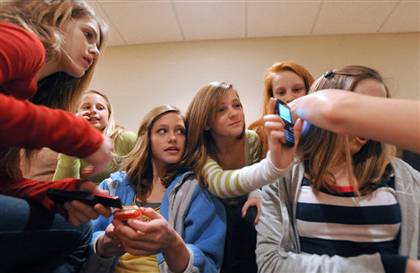
updated 8:45 p.m. ET June 16, 2010
From the time they met in kindergarten until they were 15, Robin Shreeves and her friend Penny were inseparable(分不开的). They rode bikes, played kickball(儿童足球) in the street, swam all summer long and listened to Andy Gibb, the Bay City Rollers and Shaun Cassidy on the stereo(立体声响器材). When they were little, they liked Barbies; when they were bigger, they hung out(一起出去玩) at the roller rink(溜冰场) on Friday nights. They told each other secrets like which boys they thought were cute, as best friends always do.
Today, Ms. Shreeves, of suburban Philadelphia, is the mother of two boys. Her 10-year-old has a best friend. In fact, he is the son of Ms. Shreeves’s own friend, Penny. But Ms. Shreeves’s younger son, 8, does not. His favorite playmate is a boy who was in his preschool class, but Ms. Shreeves says that the two don’t get together very often because scheduling(安排日程) play dates can be complicated; they usually have to be planned a week or more in advance. “He’ll say, ‘I wish I had someone I can always call,’ ” Ms. Shreeves said.
One might be tempted to feel some sympathy for the younger son. After all, from Tom Sawyer and Huck Finn to Harry Potter and Ron Weasley, the childhood “best friend” has long been romanticized in literature and pop culture — not to mention in the sentimental memories of countless adults.
But increasingly, some educators and other professionals who work with children are asking a question that might surprise their parents: Should a child really have a best friend?
Most children naturally seek close friends. In a survey(调查) of nearly 3,000 Americans ages 8 to 24 conducted last year by Harris Interactive, 94 percent said they had at least one close friend. But the classic best-friend bond — the two special pals who share secrets and exploits(功绩), who gravitate(吸引) to each other on the playground and who head out the door together every day after school — signals potential trouble for school officials intent on(有意于做某事) discouraging(不鼓励) anything that hints of exclusivity(排他性), in part(在部分程度上) because of concerns about cliques(小圈子,小帮派) and bullying(欺负弱小).
“I think it is kids’ preference(偏爱) to pair up(结对) and have that one best friend. As adults — teachers and counselors(顾问) — we try to encourage them not to do that,” said Christine Laycob, director of counseling at Mary Institute and St. Louis Country Day School in St. Louis. “We try to talk to kids and work with them to get them to have big groups of friends and not be so possessive(占有欲强的) about friends.”
“Parents sometimes say Johnny needs that one special friend,” she continued. “We say he doesn’t need a best friend.”
Should school discourage kids from seeking out a best friend? What's your opinion?

